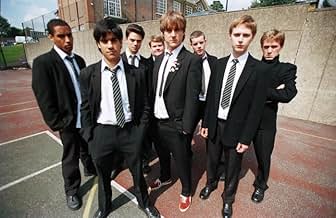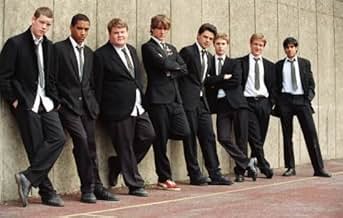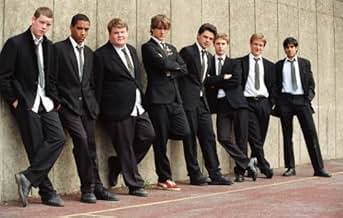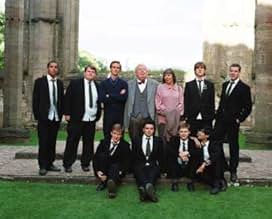Dos profesores excéntricos e innovadores enseñan a una clase formada por adolescentes rebeldes, talentosos y encantadores, mientras su director les presiona para que todos sean aceptados en ... Leer todoDos profesores excéntricos e innovadores enseñan a una clase formada por adolescentes rebeldes, talentosos y encantadores, mientras su director les presiona para que todos sean aceptados en Oxford o Cambridge.Dos profesores excéntricos e innovadores enseñan a una clase formada por adolescentes rebeldes, talentosos y encantadores, mientras su director les presiona para que todos sean aceptados en Oxford o Cambridge.
- Nominada a2premios BAFTA
- 2 premios ganados y 15 nominaciones en total
Argumento
¿Sabías que…?
- TriviaThe cast for this movie are the same cast who appeared in the original play at the National Theatre in London, England.
- ErroresLockwood was killed in action with the York and Lancaster Regiment. They were disbanded in 1968.
- Citas
Hector: The best moments in reading are when you come across something - a thought, a feeling, a way of looking at things - that you'd thought special, particular to you. And here it is, set down by someone else, a person you've never met, maybe even someone long dead. And it's as if a hand has come out, and taken yours.
- Créditos curiososAt the beginning of the film, the title - "The History Boys" - is taken letter by letter from random parts of an essay on the dissolution of the monasteries, a common history topic, which the History Boys themselves write later on in the film.
- Bandas sonorasL'Accordéoniste
Music by Michel Emer
Lyrics by Michel Emer
© 1945 S.E.M.I., France / Peer Music (U.K.), Ltd., London
Performed by Samuel Barnett & Jamie Parker
Apart from the boys, the two main characters are two of their teachers. Hector, an elderly man approaching retirement, is the general studies teacher whose role is to give the boys some general cultural background. He has a deep love of learning and believes strongly in the value of knowledge for its own sake. He has, however, become something of a figure of fun to the boys, partly because of his portly figure and his occasionally eccentric teaching style, but mostly because he is a homosexual (although trapped in an unhappy marriage), given to fondling his pupils, especially when giving them a lift on his motorcycle.
Irwin is a young history specialist brought in by the school to coach the boys for this examination. Unlike Hector, who has a deep reverence for truth as an absolute value, Irwin takes the Pontius Pilate line, "what is truth?", and encourages the boys to question received ideas about history. Like Hector, he too is homosexual, and becomes involved with Dakin, one of the boys. Dakin, who is bisexual, is also having an affair with Fiona, the headmaster's attractive secretary; another boy, Posner, who is just realising that he is gay, has an unrequited crush on Dakin.
Bennett's play was recently used by A A Gill, the left-wing TV critic of the "Sunday Times", as a stick with which to beat conservative historians. (He was thinking of the likes of Niall Ferguson, Andrew Roberts and David Starkey). He compared their revisionist approach to history to that of Irwin which he saw as intellectually dishonest, mere contrarianism for the sake of stirring up controversy (and publicity). That seemed to me, however, to be a misinterpretation. Bennett was not criticising historians who seek to re-evaluate the past rather than simply repeating traditional received ideas. Irwin may not be interested in truth for its own sake, but his approach to history is advocated less as a method of philosophical inquiry than as an exam-passing technique, his argument being that a deliberately controversial approach is more likely to impress Oxbridge dons jaded from marking too many papers. (In any case, some of Irwin's ideas- such as the claim that the Allies as well as the Germans were to blame for the outbreak of World War One- would not have been particularly controversial among historians in the eighties).
The film has been criticised for its homosexual themes, some reviewers going so far as to attack Bennett for allegedly defending paedophilia, which strikes me as another misconception. The boys in this film would all be aged eighteen or nineteen, and therefore of the age of consent, even for homosexual acts. The issue which Bennett raises is not "Is paedophilia defensible?", but "Are sexual relationships appropriate between teachers and pupils, regardless of age?", and his answer appears to be "no". Hector's penchant for fondling his pupils has, despite his gifts as a teacher, led to his becoming a laughing-stock and diminished his authority among the boys. Bennett certainly concentrates on homosexuality (apart from the Dakin-Fiona affair, there is surprisingly little- for a film about teenage boys- mention of heterosexual relationships), but it must be remembered that he is himself gay and, like most writers, concentrates on those issues which are most important in his own life. The film would doubtless be very different, and possibly more popular with heterosexual audiences, if the scriptwriter had been heterosexual. It would, however, be unfortunate if audiences allowed themselves to be dissuaded from seeing the film.
I felt that Bennett raised some potentially interesting themes which he did not pursue, such as the female teacher's feminist comments about the role of women in history and the discussion about whether the Holocaust is a subject that can be studied by historians like any other, but it seems to me that the film was not so much a film of ideas as a study in personalities and relationships. Richard Griffiths was very good as Hector, bringing out both sides of his personality. On the surface Hector is a larger-than-life, jovial character, ever ready for a laugh with the boys, but beneath that surface he is a sensitive, often unhappy, man. I also liked Stephen Campbell Moore's cynical but also vulnerable Irwin and Clive Merrison's pompous, autocratic headmaster (even if he was a bit of a caricature). The boys mostly emerged as distinct personalities in their own right- the handsome, cocksure Dakin, the shy, tormented Posner, the hearty sportsman Rudge, and so on.
The other thing I liked about the film was that, in spite of some serious themes and a tragic denouement, it is often brilliantly funny. Like a number of other reviewers I was particularly struck by the scene, played all in French without subtitles, where Hector gets the boys to act out a scene in a brothel and then (when the headmaster unexpectedly enters) tries to pretend that they were re-enacting a scene from a wartime hospital! There are also some perceptive one-liners, from Hector Irwin and the boys, such as the paradoxical, but often true, observation that the best way to forget something is to commemorate it. This is a film with much to enjoy, quite apart from the pleasures of nostalgia. (I attended a grammar school very similar to this one in the late seventies before going to Cambridge). 7/10.
- JamesHitchcock
- 15 nov 2006
- Enlace permanente
Selecciones populares
- How long is The History Boys?Con tecnología de Alexa
Detalles
- Fecha de lanzamiento
- Países de origen
- Sitio oficial
- Idioma
- También se conoce como
- Любителі історії
- Locaciones de filmación
- Productoras
- Ver más créditos de la compañía en IMDbPro
Taquilla
- Presupuesto
- GBP 2,000,000 (estimado)
- Total en EE. UU. y Canadá
- USD 2,706,659
- Fin de semana de estreno en EE. UU. y Canadá
- USD 100,803
- 26 nov 2006
- Total a nivel mundial
- USD 13,407,101
- Tiempo de ejecución1 hora 49 minutos
- Color
- Mezcla de sonido
- Relación de aspecto
- 1.85 : 1
Contribuir a esta página






































